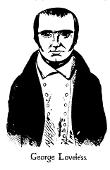George Loveless was born in 1797, in the small village of Tolpuddle, Dorset County, England. Dorset County, located on the coast in the south-west area of England, was heavily reliant on agriculture and far removed from the cultural and political hub of the country. Loveless spent much of his early life working on farms in the local area, also becoming literate during this period. By 1830, Loveless had married a local girl and they had given birth to three children. Working as a ploughman and a Wesleyan preacher, Loveless had also emerged as a powerful figure in the local community. With the onset of unionism and agrarian dissent during this period, Loveless would soon gain nationwide attention.
Over the next two years, Loveless became involved in discussions with local farmers to raise the wage for agriculture workers. While these discussions achieved some results, many workers were facing wage cuts in other parts of the county. In 1833, Loveless was approached by two union delegates and encouraged to take action. The reverend and a number of labourers in the area formed the "Friendly Society of Agricultural Labourers". The friendly society aimed to provide a support network for struggling agriculture workers, charging a weekly fee for its members. Regular meetings were held at a associates cottage,Thomas Standfield, at Tolpuddle.
It is unknown whether the group was involved in any overtly political actions yet a complaint was made to the government that this union had sworn oaths to one another, a occurrence that was prohibited under the 1797 Unlawful Oaths Act. George Loveless, his brother James and four other men from the Society were soon arrested in 1834 to await trial.
George Loveless and his five associates appeared before Judge Baron John Williams in the landmark R v Loveless and Others case in 1834. The six men were famously found guilty and sentenced to seven years penal transportation to Australia. Public outrage followed the verdict and was prevalent throughout the entirety of their sentence. George Loveless was subsequently separated from the rest of the group destined for New South Wales, arriving in Hobart in September that same year.
While the six men were being transported to Australia, support for their cause was growing in England. They were seen as martyrs for the working classes and their story was receiving widespread attention. A political march was organised for the streets of London on January 31, 1834, and was attended by scores of the working classes. Numerous petitions for the release of the "Tolpuddle Martyrs" also began circulating throughout the countryside. With this petition and mounting support both within and outside of Parliament, the British government agreed to pardon all but one of the prisoners in 1836.
In Tasmania, Loveless was initially sent to work on a farm as a shepherd and stock keeper. Following this, he took up employment in Richmond under Major William de Gillern. Here, Loveless was informed of his pardon and offered a free passage home. He had previously written to his wife asking her and the family to join him and thus decided to wait a few months to ensure that they had not set sail. After confirming that they had not, Loveless boarded the Eveline and made it back home in June of 1837. Back in England, he promptly provided his story for use in a political pamphlet, "The Victims of Whiggery". Similarly, he also contributed to a second pamphlet, "The Horrors of Transportation", in 1838.
The Lovelesses (including his brother James) settled on a farm near Chipping Ongar, Essex. The Standfields and James Brine also purchased neighbouring farms. All these men become actively involved in charitable causes and were active in the local community. A few years later these families emigrated to Canada. George Loveless died on a farm at London, Ontario, on 6 March 1874. He is remembered as a prominent figure in the early union movement and as a devoted member of his local community.
See full Auslit entry.
 3351754793635644079.jpg
3351754793635644079.jpg
 3351754793635644079.jpg
3351754793635644079.jpg